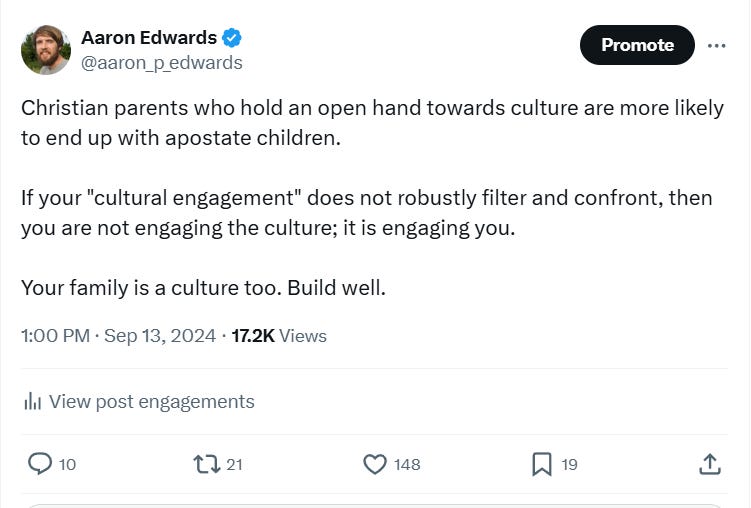The Cost of Our Cultural "Engagement" I
We Need Christian Communities Who Stand Tall Against the World
In our cultural engagement, are we engaging the culture or is the culture engaging us? What kinds of community will be able to stand against the storms to come?
Several weeks ago I tweeted something about cultural engagement and backslidden or unbelieving children over the long haul.
This perspective seemed to resonate with a few people at the time, including Rod Dreher, author of Live Not By Lies: A Manual for Christian Dissidents (see a podcast episode I hosted on that book a few years ago).
The Benedict Option and Culture
Before this time, Dreher had become more widely known by writing The Benedict Option: A Strategy for Christians in a Post-Christian Nation. I first came across that book in 2017, and—even with some reservations about the potentially withdrawn posture—found the general diagnosis to be both arresting and prophetic, crystallising much of what I had begun to discern about the longer term direction of travel within and beyond the Church.
I even used it as a set text in an MA Mission module I used to run at Cliff College (prior to the unpleasantness). The Benedict Option seminar often catalysed quite a bit of heated discussion at the time. Some students saw it as a profound warning that Christians needed to wise up, wake up, and start implementing action plans for how to maintain our convictions in the midst of encroaching pressure upon the Church from secular culture.
Others seemed wary of it. Some were wary because they were liberal and did not take kindly to references to “the LGBT agenda” as a menace on the horizon. Others were troubled because they were evangelical ostriches who did not want to believe the coming storm was not only coming but was already here.
Still others saw the dangers but believed that Dreher’s strategy—of collecting into tighter-knit Christian communities on the same page doctrinally, missionally, and thus “culturally”—was a new form of “fundamentalism”. At worst, they thought, this would drive Christians into cults; at best, it would hinder them from engaging the culture in their everyday mission.
It is this latter preconception by which many misunderstood The Benedict Option at the time. It is not a replacement of mission and an abandonment of culture; it is a call to be wiser about how we engage culture for the sake of our longer term mission, including the transformation of culture. This is what Dreher himself indicated in his use of my Tweet at the time.
It’s quite simple. Christians who want to remain Christian should actively live, talk, and support one another like faithful Christians. And Christians who want their children to remain Christians need to actively ensure their children have the best possible chance of living and talking and being supported by faithful Christians.
Half-hearted Christianity won’t cut it. Fake Christianity won’t cut it. Hypocritical Christianity won’t cut it. It needs to be the real thing. We must build on the rock, the whole rock, and nothing but the rock, if we are to withstand the storms to come (cf. Matt. 7:24-27).
The Fruit of Cultural “Engagement”
In light of the storms of secularism and the rapid de-Christianisation of western culture over the last two centuries, modern Christians have been especially zealous to “win back” and/or evangelise the culture. Sometimes this has been via direct political action with (often compromised) political parties. For others, it has been through living essentially secular lifestyles dressed up as their call to be “salt and light”.
The truth is, we were sold a lie about the true fruit of our efforts at “cultural engagement”. It hasn’t worked. The policy of cultural engagement has not only not stopped the rot in western societal decline, but it has accelerated the ecclesial decline, softening the bricks for the oncoming liberal invasions to undermine and erode our convictions from within.
Look at even the “conservative” churches in our land. Look at the lives and perspectives of its leaders and average congregants, and see how uncontroversially, how nonchalantly, they now mirror so many of those within our secular culture far more than that of their Christian forebears of even recent bygone generations. This has laid the groundwork of burrowing beneath the authority of Scripture, breeding ever more pervasive embarrassment at what it teaches in light of their passive acceptance of the new conventional norms of the employers, colleagues, teachers, doctors, journalists, and politicians in whose fish-tanks they so obediently swim.
In short: Christian cultural engagers over the last several decades have ended up expositing from culture far more than they have deposited to it. They have received far more than they have given. And none of this happened by accident.
Communities Who Stand Against
The solution is indeed not to “run to the hills” (as many thought Dreher was implying) but to make strategic withdrawals whereby we might recover our convictions in strong, supportive, faithful communities (especially with regard to the protection and nurture of children in the faith). Such communities should have families at the heart of them, supporting others around them. Think here, of just how significant Christian households were within the early Church, and how often the New Testament epistles address this in so many different ways.
Being faithful in community sounds like what many churches are already trying to do, of course, so what’s unique about any of this? In principle, perhaps nothing; in practice, perhaps everything. It really is a call to simply be the Church again. The difference is that for such communities to withstand the storms in coming years they will need to take a radically different stance to the surrounding culture and how they do (and don’t) engage within it to that which we have been “taught”. And we certainly have much to unlearn.
This is not because we should withdraw from the world in fear. Quite the opposite. In such perilous times for Christian faithfulness, we need strong home bases from which to remain bright lights within the world, living and proclaiming the truth, reminding people of what has been lost, and even taking back what has been taken by the various (multi)cultural barbarians of our time. This includes standing up for our Christian cultural heritage whilst also reminding people that a recovery of such heritage will be empty if its advocates do not seek the Christ at the roots of their Christianity.
But there will be no lasting Christian heritage again without robust Christian communities who know how to count the cost of following Christ, who do not merely seek to “engage” the culture, but count the cost of “enraging the culture” too, wherever that culture happens to lose its mind over our stubborn unwillingness to stop living, acting, and talking like Christians.







Aaron, I get what you’re saying. Yet as I’ve been waiting on God about what to do with my time, I felt that He was calling me to get involved with a community project, near my church, that helps women of different cultures, backgrounds and religions, who feel isolated. As the only Christian there I feel God is telling me to not be afraid to stand up and speak the truth, in love, as the need arises in that environment. And not take part in anything that goes against my faith. He has shown me that I am not to judge them, but show a different way by my example.
What are your thoughts?
Thank you for helping us fight the good fight. We should setup a time to talk with the incoming waves of atheism with AI that are coming.